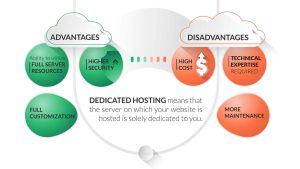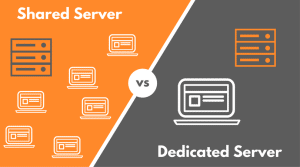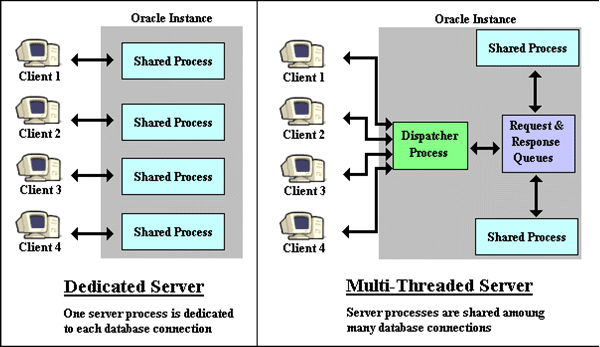Dedicated vs. Shared Servers: Which One is Right for Your Business?
This is one of the most crucial decisions you will have to make when it comes to web hosting, and it involves deciding between dedicated servers and shared servers. Each choice comes with its own set of benefits and downsides, and the one that is best for you will be determined by the particular requirements and objectives that you have. In the following paragraphs, we will discuss the distinctions between dedicated servers and shared servers, and we will also assist you in determining which type of server is most suitable for your company. Dedicated vs. Shared Servers

Understanding the Basics: What Are Dedicated and Shared Servers?
Dedicated Servers
As the name suggests, a dedicated server is a physical server that is utilized just by a single enterprise. In other words, a single user has access to all of the server’s resources, including the central processing unit (CPU), random access memory (RAM), and storage space. It is common for dedicated servers to be more expensive than shared servers due to the fact that dedicated servers provide higher control, customisation, and performance levels.
Shared Servers
A shared server, on the other hand, is a server that manages numerous websites on the same physical server. As a result of each website sharing the server’s resources with other websites, prices are reduced substantially. There is a possibility that this approach will result in poorer performance and less control over the server environment, despite the fact that it may be financially advantageous.
Key Differences Between Dedicated and Shared Servers
Performance and Speed
The difference in performance between dedicated servers and shared servers is one of the most important distinctions between the two. You get access to all of the server’s resources when you have a dedicated server, which can result in faster load times and greater performance, particularly for websites or applications that receive a lot of traffic. When compared to shared servers, shared servers may have slower performance due to the rivalry for resources that occurs between several websites.
Security and Privacy
Security is yet another important factor to take into account. Dedicated servers provide a higher level of protection because you are the only user on the server. This reduces the likelihood that other websites on the same server would launch attacks against your website. On the other hand, shared servers are more susceptible to security breaches than private servers because a single compromised website has the ability to harm other websites that are hosted on the same server.
Control and Customization
By providing full control over the server environment, dedicated servers make it possible to customize the server environment to a great extent. Among these capabilities are the opportunity to select the operating system, the installation of individualized software, and the modification of server settings. There is a limited amount of control available with shared servers because the configurations of the server are normally maintained by the hosting provider and are standardized for all users on the server.
Cost Considerations

Dedicated Servers: A Higher Price for Greater Value
When compared to the cost of a shared server, the cost of a dedicated server is typically significantly more. The reason for this is that the hardware is used exclusively, and the server may be customized to fit the requirements of a range of different situations. It may be profitable for organizations to make the investment in a dedicated server if they demand high levels of performance, dependability, and security.
Shared Servers: Budget-Friendly but with Trade-offs
Because shared servers are a cost-effective option, they are appealing to individuals who run personal websites, as well as business startups and small organizations. It is because several users share the server’s resources that the cost is lower than it would otherwise be. On the other hand, this low cost comes with a number of drawbacks, including decreased performance, security, and control.
Choosing the Right Option for Your Business
When to Choose a Dedicated Server
Businesses that want high levels of performance, security, and customisation will find that a dedicated server is the best solution. Investing in a dedicated server is the ideal option for your website if it is subject to significant traffic, requires specialized software, or requires improved security measures. On top of that, it is suited for companies who are required to comply with stringent requirements on data privacy.
When to Choose a Shared Server
Shared servers are an excellent alternative for people and businesses who are searching for a solution that is both cost-effective and efficient. tiny to medium-sized websites that receive modest traffic, such as blogs, informational websites, and tiny e-commerce enterprises, are some examples of websites that are suited for using these. A shared server can give enough performance at a lesser cost if your website does not require considerable customisation or high levels of protection. If this is the case, then you should consider it.
Future Growth and Scalability
Scalability with Dedicated Servers
It is possible to scale dedicated servers, which is one of the advantages of using them. As your company expands and the number of visitors to your website rises, you have the option of upgrading the hardware of your server or adding additional resources in order to satisfy demands. Because of this flexibility, your website will be able to handle growing traffic without sacrificing its performance.
Scalability with Shared Servers
There is a limited capacity for scalability with shared servers; nevertheless, some hosting companies offer the opportunity to upgrade to higher plans that include additional resources. However, if your website grows to the point that it exceeds the capabilities of the shared server, you may eventually be required to switch to a dedicated server or another hosting plan that provides you with more resources and allows you more control.

Conclusion: Making the Right Choice
Your individual business demands, budget, and growth objectives should all be taken into consideration when making a decision between dedicated and shared servers. As a result of their greater performance, security, and customization capabilities, dedicated servers are an excellent choice for companies that have strict requirements. The control and performance of shared servers are compromised, despite the fact that they are more cost-effective than dedicated servers.
You will be able to make an educated decision that will support the online presence and success of your company if you give serious consideration to your requirements and future expansion. Choose a hosting solution that corresponds with your business goals and provides the required resources and support, regardless of whether you go with a dedicated server or a shared server. This is the most important thing to keep in mind.





